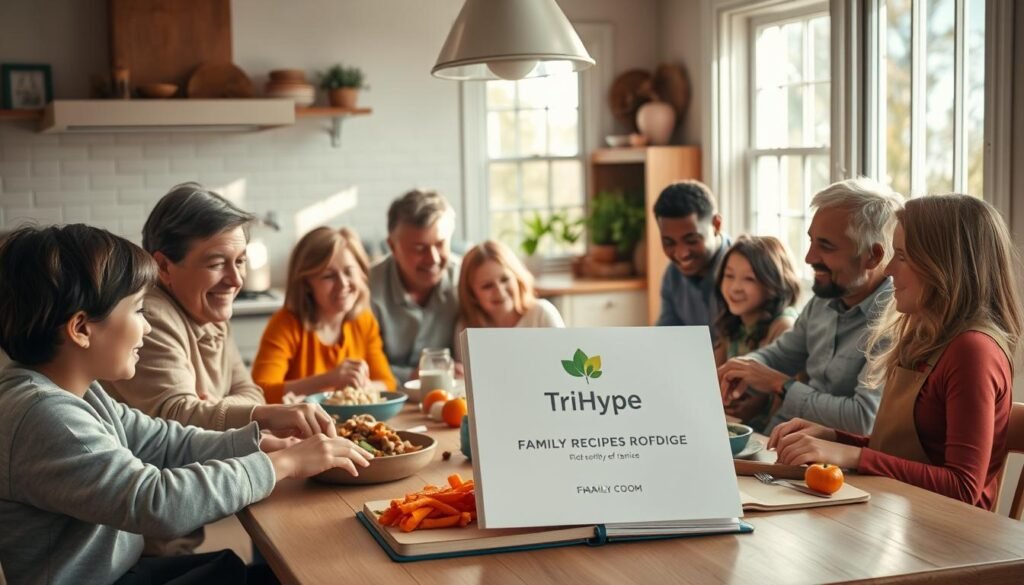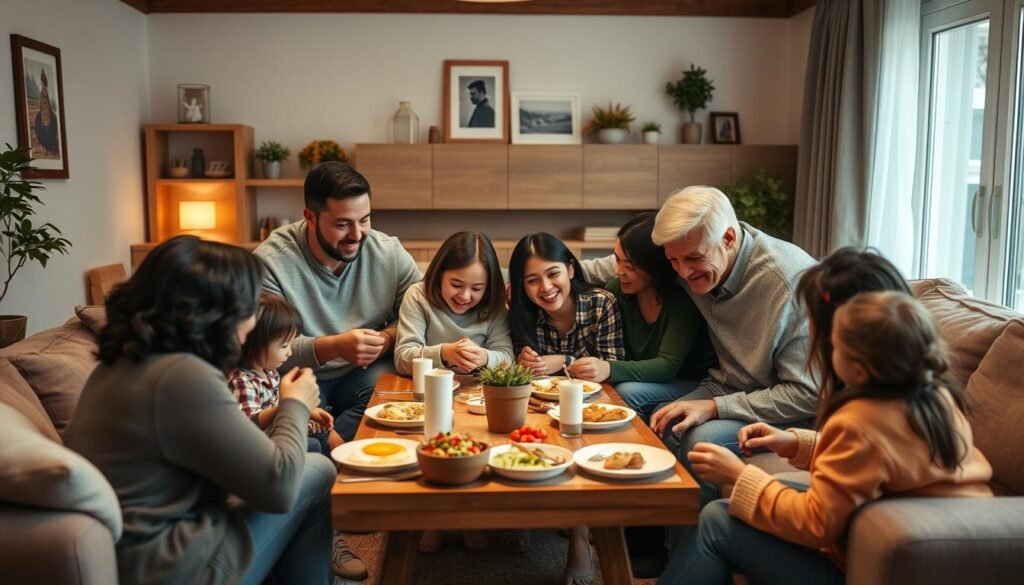“The family is one of nature’s masterpieces.” – George Santayana, philosopher and essayist. In today’s fast world, it’s easy to lose touch with our loved ones. Yet, strengthening family bonds is key for our happiness and the strength of our family. This article will share strategies and tips to help you create lasting connections with your family. Together, you can build a supportive and thriving home.
Key Takeaways
- Fostering a sense of belonging and emotional support within the family
- Effective communication as the foundation for stronger family bonds
- Prioritizing quality time together and creating cherished memories
- Sharing family values and traditions to strengthen family identity
- Navigating conflicts with grace and empathy
The Importance of Strong Family Bonds
Strong family bonds are the foundation of a supportive and caring environment. When family members feel a deep connection, it boosts emotional well-being and resilience. Family communication, support, and shared experiences are key to building these lasting bonds.
Fostering a Sense of Belonging
A close-knit family is a safe place where everyone feels accepted and valued. This feeling of belonging is vital for our emotional growth and well-being. By building trust, empathy, and open communication, families can make everyone feel important.
The Benefits of a Close-Knit Family
Strong family bonds bring many benefits beyond the home. Children in loving families often have higher self-esteem and better grades. They also have healthier social skills.
Strong family ties are also linked to less stress and better mental health. They give us a sense of purpose and help us face life’s challenges with strength.
To strengthen family bonds, focus on good communication, emotional support, and shared experiences. By doing this, we build a strong family foundation. This empowers each member to grow and reach their full potential.

“The strength of a family, like the strength of an army, is in its loyalty to each other.”
Effective Communication: The Key to Stronger Bonds
Building strong family bonds starts with effective communication. We can do this by listening well, solving conflicts, and welcoming emotional talks. This way, we deepen our family ties and understand each other better.
Active listening is key to meaningful talks. It means being fully there, asking good questions, and really trying to get what others think. When we listen without interrupting, we show we care about their feelings and stories.
Conflicts are normal in families, but how we handle them matters. By being empathetic, flexible, and willing to compromise, we can make our bonds stronger. It’s all about family communication, conflict resolution, and letting our emotions shine.
“The single biggest problem in communication is the illusion that it has taken place.” – George Bernard Shaw
In the end, good communication is the base of strong family bonds. By improving these skills, we make sure everyone feels heard and valued. This is the start of a lifetime of love and unbreakable ties.

| Effective Communication Strategies | Benefits |
|---|---|
|
|
Quality Time Together: Creating Lasting Memories
At the heart of strengthening family bonds is quality time together. Meaningful activities and shared experiences help us connect deeply. These moments create memories that last a lifetime.
Family Activities and Shared Experiences
There are many ways to spend quality time with family. Outdoor adventures, family game nights, and cooking meals together are great options. These activities help us focus on each other, away from daily distractions.
Unplugging and Being Present
In today’s digital world, it’s key to unplug and be present. Putting away our devices lets us fully engage in the moment. This practice strengthens our bonds and helps us enjoy the simple things.
Quality time is essential for creating lasting memories and deepening family ties. By valuing shared experiences and being mindful, we build a strong, loving family. This unity helps us face life’s challenges together.
Strengthening family bonds through Shared Values
A strong family has shared beliefs, traditions, and values. These unite its members. By agreeing on core principles, families feel closer, have a shared purpose, and feel they belong.
Family values like respect, loyalty, and compassion are key. They guide how family members treat each other and the world. When everyone values these, they feel united and know what’s important.
Beliefs and traditions also strengthen family ties. Celebrating holidays, honoring heritage, and sharing stories create a strong family identity. These activities connect generations and deepen appreciation for family history.
| Core Family Values | Benefits of Shared Beliefs |
|---|---|
| Respect | Stronger sense of identity |
| Loyalty | Deeper appreciation for family history |
| Compassion | Fostering intergenerational connections |
| Responsibility | Cultivating a shared sense of purpose |
Embracing shared values, beliefs, and traditions builds a strong family. This supports their emotional, social, and spiritual health. It strengthens their bonds, creating unity, belonging, and lasting connections.

“The strength of a family, like the strength of an army, is in its loyalty to each other.”
Emotional Support: Nurturing Empathy and Understanding
Building a strong family bond is more than just doing things together. It’s about supporting each other emotionally and understanding each other deeply. By listening and creating a safe space for talking, we can grow closer and build trust.
Validating Feelings and Emotions
In today’s world, it’s easy to forget the value of listening to our loved ones. Emotional support means really listening and showing compassion. It helps everyone feel safe and trusted, making our family stronger.
Providing a Safe Haven
A family should be a place where everyone feels safe and accepted. By creating a space where we can share openly, we encourage being true to ourselves. This acceptance is key to forming strong emotional bonds.

“The most important thing that parents can teach their children is how to get along without them.” – Frank A. Clark
Emotional support is crucial in family life. It’s the foundation of lasting bonds. By being empathetic and creating a safe space, we build a resilient and connected family.
Conflict Resolution: Navigating Disagreements with Grace
In any close-knit family, conflict is a natural occurrence. However, with the right approach, these disagreements can be transformed into opportunities for growth and strengthening family bonds. By harnessing the power of conflict resolution, healthy communication, and emotional intelligence, we can navigate even the most challenging family problems with grace and understanding.
The key to effective conflict resolution lies in our ability to communicate openly and respectfully. When a disagreement arises, it’s important to listen actively, seek to understand each other’s perspectives, and avoid defensive or aggressive language. By focusing on family problem-solving rather than attacking one another, we can find constructive solutions that address the underlying issues.
- Actively listen to each other’s concerns and needs.
- Seek to understand rather than to win the argument.
- Use “I” statements to express your feelings and perspectives.
- Engage in respectful dialogue, avoiding blame and criticism.
- Explore compromises and mutually beneficial solutions.
Equally important is the ability to regulate our emotions during tense situations. By practicing emotional intelligence, we can diffuse conflicts before they escalate and maintain a calm, rational approach. This might involve taking breaks, using de-escalation techniques, or seeking the guidance of a neutral third party, such as a family counselor.
“The greatest weapon against stress is our ability to choose one thought over another.” – William James
Ultimately, conflict resolution is not about winning or losing, but about finding a way to move forward together as a family. By embracing this mindset, we can navigate even the most challenging disagreements with grace, strengthening our bonds and fostering a deeper understanding of one another.

| Conflict Resolution Strategies | Benefits |
|---|---|
| Active Listening | Helps to understand each other’s perspectives and needs |
| Emotional Regulation | Prevents escalation and promotes calm, rational dialogue |
| Compromise and Negotiation | Leads to mutually satisfactory solutions |
| Seeking Third-Party Guidance | Provides an objective perspective and facilitates resolution |
Embracing Family Traditions and Rituals
In today’s fast world, family traditions and rituals are key. They strengthen family bonds and create lasting memories. These practices help us feel connected and build a strong family identity.
Fostering a Sense of Identity
Family traditions and rituals make us who we are. They give us a sense of belonging and a strong family identity. Whether it’s family dinners, holiday celebrations, or yearly activities, these moments connect us to our heritage.
Creating Cherished Memories
Family traditions and rituals keep us grounded in changing times. They create memories that become part of our family’s legacy. These experiences shape the stories we tell our children and grandchildren.

“Traditions are the guideposts driven deep into our subconscious minds. The most important thing we can do for our children is to give them what we were given: to give them the opportunity to dream, to give them the opportunity to succeed.” – Bryan Cranston
By embracing family traditions and rituals, we strengthen our bonds and create lasting memories. These practices are the foundation of a close and thriving family.
Parenting Strategies for Strengthening Family Bonds
As parents, we have a special chance to build strong family bonds early on. By using effective parenting strategies, we can create lasting connections. These bonds will help our family feel a deep sense of belonging for generations.
Open communication is key to strengthening family bonds. When we let our kids share their thoughts and feelings freely, we create a safe space. Here, they feel heard and understood.
- Foster a culture of active listening in your family, where everyone’s voice is valued.
- Set aside dedicated time for family discussions, allowing everyone to share their experiences and perspectives.
- Validate your children’s emotions and help them navigate challenging situations with empathy and support.
Quality time together is also vital. Family game nights, shared meals, or outdoor adventures create memories. These moments strengthen the bonds between family members.
“The family is one of nature’s masterpieces.” – George Santayana
By modeling positive behaviors and encouraging family activities, we teach unity and belonging. This will last a lifetime.
Strengthening family bonds is a journey that takes patience, dedication, and commitment. By using these strategies, we can build a strong, resilient, and joyful family. This family will thrive for years to come.
Intergenerational Connections: Bridging the Gap
Building strong family ties goes beyond just our homes. At the core of a strong family is the bond between generations. We learn from our elders and grow closer to our extended family.
Respecting and Learning from Elders
Our elders have a wealth of wisdom and life stories. By listening to them, we learn about our family’s history and values. This respect and sharing of knowledge strengthens our bonds and guides us through life.
Fostering Relationships with Extended Family
Our extended family offers love, support, and connection. Hosting family gatherings, sharing experiences, or staying in touch are ways to build these bonds. These efforts create a strong support network that lasts through good and bad times.
“The strength of a family, like the strength of an army, lies in its loyalty to each other.”
– Mario Puzo
Family Counseling: A Path to Healing and Growth
Family life is full of ups and downs. Sometimes, we need extra help to get through tough times. Family counseling and therapy are key in these moments. They help families talk better, solve problems, and heal emotionally.
Strategic Family Therapy is a powerful tool. It works on changing family behaviors, especially with kids and teens. It teaches trust, open talk, respect, and support. These are the building blocks of strong family ties.
New therapy methods and tech are changing how families heal. For example, online counseling lets families get help at home. This makes it easier and safer, especially when times are hard.
“Family counseling is not just about addressing immediate concerns; it’s about nurturing the long-term resilience, unity, and well-being of the family unit as a whole.”
Starting family counseling opens doors to understanding and empathy. It helps families work through issues and talk better. This journey builds a deep sense of belonging and healing that lasts forever.
| Benefits of Family Counseling | Outcomes |
|---|---|
| Improved communication | Enhanced family relationships |
| Conflict resolution | Stronger emotional bonds |
| Emotional healing | Greater resilience and adaptability |
| Strengthened family bonds | Increased sense of belonging and support |
Strengthening Family Bonds: A Lifelong Journey
Building strong family bonds takes time and effort. It’s a journey that changes as family needs and dynamics shift. This journey is lifelong, adapting to every stage of life.
Family bonds are the base of a happy family. They give a sense of belonging, security, and support. Seeing these bonds as something to always work on helps families face life’s ups and downs better.
As families grow, they face new challenges and chances. These can be big, like starting a family or caring for aging parents. Staying committed to family bonds makes families stronger and closer.
By spending quality time together, talking well, and sharing values, families build a strong legacy. This journey has its tough spots, but with patience and a willingness to change, families can create lasting bonds.
“The greatest legacy one can pass on to one’s children and grandchildren is not money or other material things accumulated in one’s life, but rather a legacy of character and faith.”
— Billy Graham
Seeing family bonds as a lifelong work helps families deal with life’s changes better. This mindset keeps family relationships strong, a source of love and support, no matter what.
| Key Strategies for Strengthening Family Bonds | Benefits of a Lifelong Commitment |
|---|---|
|
|
Strengthening Personal Relationships: Expert Tips
Conclusion
We’ve learned how to strengthen family bonds through communication, spending quality time, and sharing values. Emotional support and handling challenges together are also key. These steps help build a strong family that lasts.
By focusing on family bonds, we create a sense of belonging and emotional well-being at home. This journey needs ongoing effort and a caring environment. But the benefits are endless.
Let’s start this journey with open hearts and a strong will to build lasting family relationships. Together, we can create a supportive and loving home. This will help us grow as individuals and as a family.
